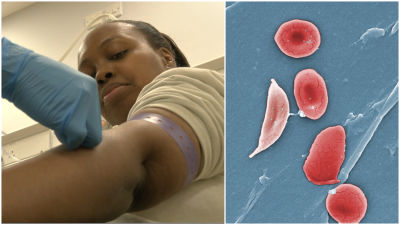The National Health Service (NHS) in England has recommended a new treatment for sickle cell disease and it is a move described as life-changing for people living with the condition in the country.
The National Institute for Health and Care Excellence (Nice) has given its recommendation for the use of Voxelotor, a drug, on the NHS in England. This recommendation is specifically for individuals aged 12 and above who have the disease.
The drug, administered as a daily tablet, is said to significantly improve the quality of life for people with sickle cell by helping to reduce their need for blood transfusions, which can then lead to fewer hospital visits.
The condition is more prevalent in people with an African or Caribbean family background, according to the NHS. In England, about 17,000 people are living with the disease. Of those, 4,000 are believed to be eligible for the new treatment.
The drug’s approval has been welcomed by charities and organizations that work closely with people living with sickle cell disease.
What Medical Practitioners Has To Say About The Drug
Charles Kwaku-Odoi, the chief executive of the Caribbean and African Health Network (CAHN), said: “On behalf of people living with Sickle Cell and the Black community as a whole, we are delighted that this treatment has been approved by Nice. This treatment offers significant hope of better quality of life to those who suffer from this often debilitating condition. At CAHN, we continue to advocate and amplify patient voices when addressing systemic inequities for an underserved community.”
John James, the chief executive of the Sickle Cell Society, said that the decision by Nice has brought “a great deal of hope, and we are profoundly grateful that this day has arrived. It is a deeply life-changing and celebrated moment for people living with the condition.”
Helen Knight, director of medicines evaluation at Nice, said: “This is great news for people with sickle cell disease, particularly given the health inequalities experienced by people with the condition.
“Throughout our appraisal of Voxelotor, the appraisal committee has always considered that it has the potential to address the need for effective treatments for sickle cell disease, as well as address Nice’s aim of reducing health inequalities.”
Prof Bola Owolabi, director of the National Healthcare Inequalities Improvement Programme at NHS England, said: “We are proud to make this new treatment available on the NHS – it could help thousands of patients living with sickle cell disease across the country to have a higher quality of life and experience fewer side effects and represents a significant step forward in addressing the healthcare inequalities experienced by some of our communities.
“It is vital that we continue to get new drugs into the hands of NHS clinicians to improve the lives of people living with sickle cell disorder.”
What You Should Know
The new treatment helps a crucial protein in red blood cells retain more oxygen, which prevents the deformation of red blood cells.
The drug, Voxelator, was initially rejected by UK health regulators and it came as a blow to the 17,500 patients living with the disease in the UK.
Voxelotor also faced NHS rejection due to cost concerns.
However, the National Institute for Health and Care Excellence (Nice) has approved the drug in the final draft guidance after a reduction in its price.
Amanda Pritchard, chief executive of NHS England, said the service had “worked hard to make this life-changing treatment available”.
She added: “Sickle cell disease can have a huge impact on people’s lives, and this is one of the biggest breakthroughs in treatment in recent decades.
“I know how much this announcement will mean for thousands of people across the country.”
Health Minister Andrew Stephenson said: “This is hugely welcome news that will help tackle longstanding health inequalities experienced by this community.”
Meanwhile, this is the first sickle cell treatment to be recommended by the National Institute for Health and Care Excellence for routine use on the NHS.










